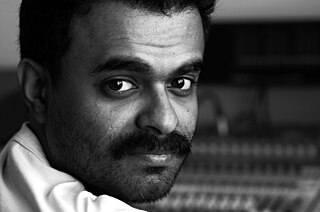Related Research Articles

Sawt is a kind of popular music found in Kuwait and Bahrain.

Fadwa Tuqan was a Palestinian poet known for her representations of resistance to Israeli occupation in contemporary Arab poetry. She has sometimes been referred to as the "Poet of Palestine".
Ali Al Jallawi is a poet, researcher, and writer. After two periods of imprisonment for writing poetry critical of the political regime in Bahrain, Al Jallawi has gone on to publish seven volumes of his work, most recently Tashta’il karazat nahd, 2008. He has written books on the Baháʼí and Jewish communities in Bahrain, and presented his poetry at dozens of literary festivals both in the Arab world and elsewhere. In Manama, he ran a research center dedicated to raising awareness of Bahrain's minority communities. However, during the Bahraini uprising, he fled the country to avoid further imprisonment. The PEN committee organized a literary fellowship in Weimar for him to save him a lengthy application for political asylum in Germany. By May 2012, he was still living in Germany, now as a fellow of the Akademie der Künste in Berlin. He is currently working on a novel titled Yadallah's Shoes.

Ebrahim Al-Arrayedh was a Bahraini writer and poet, generally considered to be one of Bahrain's greatest poets and one of the leaders of the Bahraini literary movement in the 20th century.
Nabaṭī, historically also known as najdi, is a vernacular Arabic poetry that stems from the Arabic varieties of the Arabian Peninsula. It exists in contrast to the poetry written according to the classical rules of literary Arabic.

Mohammed Haddad is a Bahraini composer and music critic. He is an active artist in the music scene of Bahrain and a leading composer in the film scores of Bahraini films. He is best known for his work on the soundtrack of the critically acclaimed Bahraini motion picture A Bahraini Tale.
Ousha bint Khalifa Al Suwaidi also known as Fatat Al-Arab, Ousha Al Sha'er was an Emirati poet. She is regarded as among the finest Arabic Nabati poets.

Qassim Haddad is a Bahraini poet, particularly notable within the Arab world for his free verse poetry. His poems have been translated in several languages including German, English and French.
Fawziyya al-Sindi is a Bahraini poet and activist. She has published six collections of poetry since 1982 and her work has been translated into several languages.
The literature of Bahrain has a strong tradition in the country. Most traditional writers and poets write in the classical Arabic style, contemporary poets that write in this style include Ali al-Sharqawi, Qassim Haddad, Ebrahim Al-Arrayedh, and Ahmad Muhammed Al Khalifa. In recent years, the number of younger poets influenced by western literature are rising, most writing in free verse or prose poetry, and often including political or personal content. Almost all publications of poetry in the country are in Arabic, with poetry rarely published in English without requiring prior translation. Ali al-Sharqawi, a decorated longtime poet, is considered by many to be the literary icon of Bahrain. The country's local writing society, the Bahrain Writers Association, was founded in 1969.
Hissa Hilal is a Saudi Arabian poet. Previously published under the pseudonym Remia, she gained fame outside the Arab world in 2010 when she recited a poem against fatwas on Million's Poet, an Emirati reality television poetry competition, and became the first woman to reach the program's finals.
Nazhūn bint al-Qulāʽiya al-Gharnātiya was a Granadan Qiyan and poet, noted for her outrageous verse.
Munira A. Al-Fadhel is a Bahraini poet, editor, writer and academic.
Fawziyya Abu Khalid is a Saudi Arabian poet, essayist, sociologist, and professor. Her poetry is noted for its prominent political motifs and focus on women's ability to attain education and freedom. Her literary reputation was established by the publication of her first poetry collection, Until When Will They Abduct You on Your Wedding Night? (1974). She went on to publish two other poetry collections, entitled the Secret Readings in the History of Arab Silence (1985) and Mirage Water (1995).

Qatari literature traces its origins back to the 19th century. Originally, written poetry was the most common form of expression, but poetry later fell out of favor after Qatar began reaping the profits from oil exports in the mid-20th century and many Qataris abandoned their Bedouin traditions in favor of more urban lifestyles.
Najah Al-Masa’eed is an Emirati poet and media figure of a Jordanian descent.
Munira Ibrahim Al Sabii is a Bahraini poet and a member of the Popular Poetry Society in the Kingdom of Bahrain. She published two collections of poetry (Diwan). The first single title “Poetic Lights” included a number of Munira's poems. The second collection was shared and had works of a number of other female poets and was issued under the title “Poets of The Million” by The Academy of Poetry in the Committee of Management of Festivals and Cultural and Heritage Programs in Abu Dhabi, as well as her study "The role of the new media in promoting cultural exchange between Arab peoples: the Arab Gulf states as a model".
Najlaa Osman Eltom is a Sudanese writer, poet and translator writing in Arabic. She also has translated short stories by other Sudanese literary writers into English. Since 2012, she has been living in Sweden.
Nimah Ismail Nawwab is a Saudi Arabian poet, activist, photographer and writer.
References
- 1 2 3 4 Paine, edited by Patty; Lodge, Jeff; Touati, Samia (2011). Gathering the Tide : An Anthology of Contemporary Arabian Gulf Poetry (1st ed.). Reading, UK: Ithaca Press. p. 49. ISBN 978-0863723742.
{{cite book}}:|first1=has generic name (help) - ↑ McClure, edited by Radwa Ashour, Ferial J. Ghazoul, Hasna Reda-Mekdashi ; translated by Mandy (2008). Arab women writers : a critical reference guide, 1873-1999. Cairo: The American University in Cairo Press. p. 257. ISBN 978-9774161469 . Retrieved 5 October 2014.
{{cite book}}:|first1=has generic name (help)CS1 maint: multiple names: authors list (link) - ↑ Radan, Silvia (April 21, 2013). "Syrian Publishers for Abu Dhabi Book Fair". McClatchy - Tribune Business News. ProQuest 1330916596.
- ↑ "ADACH publishes Arabic poetry collection with English translations". Emirates News Agency. June 6, 2010. Retrieved 5 October 2014.
- ↑ Hasan, Marhamah (January 20, 2010). Voices: An annotated anthology of contemporary Bahraini poetry. Victoria, Canada: Trafford. p. 55.
- ↑ editor Gall, Thomas L.; Hobby, Jeneen (2009). Worldmark Encyclopedia of Cultures and Daily Life. Vol. 3: Asia & Oceania (2nd ed.). Detroit: Gale. pp. 76–82. Retrieved 16 October 2014.
{{cite book}}:|last1=has generic name (help)